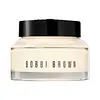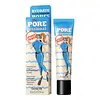What's inside
What's inside
 Key Ingredients
Key Ingredients

 Benefits
Benefits

 Concerns
Concerns

 Ingredients Side-by-side
Ingredients Side-by-side

Water
Skin ConditioningCyclopentasiloxane
EmollientBis-Diglyceryl Polyacyladipate-2
EmollientButylene Glycol
HumectantPPG-2 Myristyl Ether Propionate
EmollientCetyl Alcohol
EmollientPEG-40 Stearate
EmulsifyingButyrospermum Parkii Butter
Skin ConditioningSqualane
EmollientGlyceryl Stearate
EmollientSorbitan Stearate
EmulsifyingEpilobium Angustifolium Extract
Skin ConditioningYeast Extract
Skin ConditioningBeta-Carotene
Skin ConditioningSodium Hyaluronate
HumectantCitrus Grandis Peel Oil
MaskingTocopheryl Acetate
AntioxidantMethyl Glucose Sesquistearate
EmollientPelargonium Graveolens Flower Oil
MaskingDimethicone Crosspolymer
Emulsion StabilisingAcrylates/C10-30 Alkyl Acrylate Crosspolymer
Emulsion StabilisingCarbomer
Emulsion StabilisingPEG-20 Methyl Glucose Sesquistearate
EmulsifyingC12-15 Alkyl Ethylhexanoate
EmollientTetrasodium EDTA
Sodium Hydroxide
BufferingPanthenol
Skin ConditioningMagnesium Ascorbyl Phosphate
AntioxidantLimonene
PerfumingCitronellol
PerfumingGeraniol
PerfumingLinalool
PerfumingChlorphenesin
AntimicrobialPhenoxyethanol
PreservativeWater, Cyclopentasiloxane, Bis-Diglyceryl Polyacyladipate-2, Butylene Glycol, PPG-2 Myristyl Ether Propionate, Cetyl Alcohol, PEG-40 Stearate, Butyrospermum Parkii Butter, Squalane, Glyceryl Stearate, Sorbitan Stearate, Epilobium Angustifolium Extract, Yeast Extract, Beta-Carotene, Sodium Hyaluronate, Citrus Grandis Peel Oil, Tocopheryl Acetate, Methyl Glucose Sesquistearate, Pelargonium Graveolens Flower Oil, Dimethicone Crosspolymer, Acrylates/C10-30 Alkyl Acrylate Crosspolymer, Carbomer, PEG-20 Methyl Glucose Sesquistearate, C12-15 Alkyl Ethylhexanoate, Tetrasodium EDTA, Sodium Hydroxide, Panthenol, Magnesium Ascorbyl Phosphate, Limonene, Citronellol, Geraniol, Linalool, Chlorphenesin, Phenoxyethanol
Water
Skin ConditioningCyclopentasiloxane
EmollientGlycerin
HumectantDimethicone/Vinyl Dimethicone Crosspolymer
Skin ConditioningDiglycerin
HumectantMethyl Methacrylate Crosspolymer
Dimethicone
EmollientDimethicone Crosspolymer
Emulsion StabilisingPentylene Glycol
Skin ConditioningHydroxyethyl Acrylate/Sodium Acryloyldimethyl Taurate Copolymer
Emulsion StabilisingIsohexadecane
EmollientPhenoxyethanol
PreservativeDiphenylsiloxy Phenyl Trimethicone
Skin ConditioningCyclohexasiloxane
EmollientSilica
AbrasiveButyrospermum Parkii Butter
Skin ConditioningIsoceteth-10
EmulsifyingPolysorbate 60
EmulsifyingParfum
MaskingDimethicone/Phenyl Vinyl Dimethicone Crosspolymer
Sorbitan Isostearate
EmulsifyingSodium Hyaluronate
HumectantLimonene
PerfumingTriethoxycaprylylsilane
BHT
AntioxidantAlumina
AbrasiveMagnesium Oxide
AbsorbentTocopherol
AntioxidantCI 19140
Cosmetic ColorantCI 42090
Cosmetic ColorantCI 77007
Cosmetic ColorantCI 77163
Cosmetic ColorantCI 77491
Cosmetic ColorantCI 77492
Cosmetic ColorantCI 77499
Cosmetic ColorantCI 77891
Cosmetic ColorantWater, Cyclopentasiloxane, Glycerin, Dimethicone/Vinyl Dimethicone Crosspolymer, Diglycerin, Methyl Methacrylate Crosspolymer, Dimethicone, Dimethicone Crosspolymer, Pentylene Glycol, Hydroxyethyl Acrylate/Sodium Acryloyldimethyl Taurate Copolymer, Isohexadecane, Phenoxyethanol, Diphenylsiloxy Phenyl Trimethicone, Cyclohexasiloxane, Silica, Butyrospermum Parkii Butter, Isoceteth-10, Polysorbate 60, Parfum, Dimethicone/Phenyl Vinyl Dimethicone Crosspolymer, Sorbitan Isostearate, Sodium Hyaluronate, Limonene, Triethoxycaprylylsilane, BHT, Alumina, Magnesium Oxide, Tocopherol, CI 19140, CI 42090, CI 77007, CI 77163, CI 77491, CI 77492, CI 77499, CI 77891
 Reviews
Reviews

Ingredients Explained
These ingredients are found in both products.
Ingredients higher up in an ingredient list are typically present in a larger amount.
This ingredient is also known as shea butter. It is an effective skin hydrator and emollient.
Emollients help soothe and soften your skin. It does this by creating a protective film on your skin. This barrier helps trap moisture and keeps your skin hydrated. Emollients may be effective at treating dry or itchy skin.
Shea butter is rich in antioxidants. Antioxidants help fight free-radicals, or molecules that may harm the body. It is also full of fatty acids including stearic acid and linoleic acid. These acids help replenish the skin and keep skin moisturized.
While Shea Butter has an SPF rating of about 3-4, it is not a sunscreen replacement.
Shea butter may not be fungal acne safe. We recommend speaking with a professional if you have any concerns.
Learn more about Butyrospermum Parkii ButterCyclopentasiloxane, or D5, is a silicone used to improve texture of products and trap moisture.
D5 is considered lightweight and volatile. Volatile means it evaporates quickly after application. Once evaporated, D5 leaves a thin barrier that helps keep skin hydrated.
It is also an emollient. Emollients help soften the skin and prevent water loss. Silicones create a silky texture in products. D5 helps other ingredients become more spreadable.
Studies show D5 is safe to use in skincare products. We recommend speaking with a skincare professional if you have concerns.
Learn more about CyclopentasiloxaneDimethicone Crosspolymer is a silicone created by modifying dimethicone with hydrocarbon side chains. Due to its large size, it does not penetrate skin. It is considered non-occlusive.
Dimethicone Crosspolymer is used to stabilize and thicken products. It also helps give products a silky feel.
Limonene is a fragrance that adds scent and taste to a formulation.
It's found in the peel oil of citrus fruits and other plants such as lavender and eucalyptus. The scent of limonene is generally described as "sweet citrus".
Limonene acts as an antioxidant, meaning it helps neutralize free radicals.
When exposed to air, oxidized limonene may sensitize the skin. Because of this, limonene is often avoided by people with sensitive skin.
The term 'fragrance' is not regulated in many countries. In many cases, it is up to the brand to define this term. For instance, many brands choose to label themselves as "fragrance-free" because they are not using synthetic fragrances. However, their products may still contain ingredients such as essential oils that are considered a fragrance.
Learn more about LimonenePhenoxyethanol is a preservative that has germicide, antimicrobial, and aromatic properties. Studies show that phenoxyethanol can prevent microbial growth. By itself, it has a scent that is similar to that of a rose.
It's often used in formulations along with Caprylyl Glycol to preserve the shelf life of products.
Sodium Hyaluronate is hyaluronic acid's salt form. It is commonly derived from the sodium salt of hyaluronic acid.
Like hyaluronic acid, it is great at holding water and acts as a humectant. This makes it a great skin hydrating ingredient.
Sodium Hyaluronate is naturally occurring in our bodies and is mostly found in eye fluid and joints.
These are some other common types of Hyaluronic Acid:
Learn more about Sodium HyaluronateWater. It's the most common cosmetic ingredient of all. You'll usually see it at the top of ingredient lists, meaning that it makes up the largest part of the product.
So why is it so popular? Water most often acts as a solvent - this means that it helps dissolve other ingredients into the formulation.
You'll also recognize water as that liquid we all need to stay alive. If you see this, drink a glass of water. Stay hydrated!
Learn more about Water